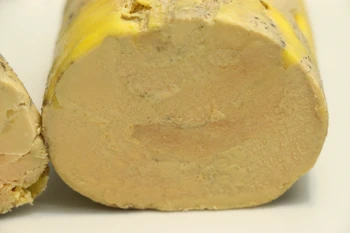Foie gras ballotine
A recipe from cooking-ez.com December 11th 202431 K4.5
For 1 foie gras, you will need:
- 1 1 raw foie gras
- 2 6 g fine (or table) salt
- 3 2 g pepper
- 4 0.5 g "Quatre-épices" spice blend
- 5 ½ teaspoon caster sugar
- 6 5 ml Port
- 7 5 ml Brandy (Cognac or Armagnac)
- Total weight: 525 grams
Times:
| Preparation | Resting | Cooking | Start to finish |
|---|---|---|---|
| 2 days 12 hours 45 min. | 4 hours 35 min. | 10 min. | 2 days 17 hours 30 min. |
Step by step recipe
- 1: If your liver is already de-veined, skip to step 9.
Deveining:
Remove the liver from the fridge at least two hours beforehand, so that it is at room temperature and therefore supple.
Rinse thoroughly under lukewarm water to remove any last traces of blood, then pat dry with paper towels. - 2: Gently pull the two lobes apart.
- 3: Pull the veins towards you so as to remove them without cutting them; you must "follow" them and accompany them, if necessary by passing your fingers through the flesh of the liver under the vein.
This is the first delicate moment of the recipe, and you must try not to forget any, or at least as little as possible. Your hands are very, very greasy, but you can use thin rubber gloves.
Note: We tend to say "nerve" and "denerver", but in fact there are no nerves in a liver, only veins. - 4: As a tool, I recommend the tip of a peeler, which is quite handy.
Another tip: place a bowl or large cup in front of you, so that you can easily scrape off the sticky bits of vein as you work. - 5: Once it's done, don't worry about the pathetic state of the liver. It's not ruined...
- 6: To remove traces of blood, immerse the liver in cold salted water with a tablespoon of coarse salt and ice cubes, for 30 minutes.
After this time, rinse the liver under cold running water and pat dry with paper towels. - 7: Line an ovenproof dish, such as a casserole dish, with cling film.
Note: This is not essential, just to save you having to clean the dish at the end. - 8: Place the liver pieces in the dish, trying to make a single layer without stacking them.
- 9: If your liver is already seasoned, skip step 13.
Seasoning:
Start with the spirits, basting the liver with a few dashes of Armagnac and Port.
You only need a few dashes, otherwise the taste of the spirits will overpower that of the liver, which would be a shame.
Note: Prefer white spirits to reds, such as white Porto, as reds tend to turn the liver gray when cooked. - 10: Weigh and mix together the spices (salt, pepper, sugar and 4-spice). You need to be very precise here, as the ratio is 7g of salt and 2g of pepper to 600g of liver.
The best way to weigh these quantities is to use a small precision scale. If you don't have one, remember that 1 level teaspoon = 5g fine salt (approx.) or 2.5g ground pepper (approx.).
This is the second tricky part of the recipe, and you'll need to keep to the weight of salt, which is linked to the weight of the liver (to help you out, check out this little automatic calculator). - 11: Sprinkle the weighed spices over the liver - it looks like a lot, so don't worry.
For a better distribution of spices, when you've poured half of them, turn the liver pieces over and spread the other half. - 12: Once you've finished seasoning the liver, cover the top of the dish with cling film and place in the fridge overnight.
Note: This time in the fridge is important for the taste of the liver. If you don't do it, it will still taste good, but not as good as liver that has rested overnight. - 13: The next day, the liver is ready to be shaped into a ballotine. Take it out of the fridge at least 2 hours before cooking.
- 14:
The ballotine
Lay a sheet of cling film in front of you, and roughly reconstitute the liver in the middle. - 15: Close the cling film and roll the liver on itself, pressing down with your hands to form a large cylinder.
- 16: Place the cylinder on a second sheet of cling film, and carefully enclose the liver in it, then fasten the ends with a piece of string - your ballotine is ready.
- 17:
Cooking
Bring a large pot of water to the boil, and when it boils, turn off the heat. - 18: Place the ballotine in hot water...
- 19: ...and place a plate on top to make sure the ballotine is completely immersed in the water.
Cover, and leave to cook gently off the heat for 2 hours. - 20: At the end of this time, you'll see that the foie gras has changed its appearance - it's actually cooked, with a little fat around it.
Take out the ballotine and dry it. - 21: Place on a plate and refrigerate.
It should remain there for at least 2 days, and ideally for a good week (or more) to allow all the aromas and flavors of the liver to develop. - 22: Remove all the cling film, and cut the ballotine into slices to taste.
Remarks
If you want a more natural, foie gras-like taste, you can reduce the alcohols in this recipe to 1 teaspoon, or even eliminate them altogether.Cognac or Armagnac doesn't make much difference (in this recipe), and the same goes for Port and Sherry, or any other mutated wine such as Marsala, Maury, Madeira, etc.
As for the bread that goes best with foie gras, don't be tempted by industrial sandwich bread, or worse, brioche or gingerbread (!), which are not at all suitable. It's better to try a bread that's a little more robust, a little more acidic, like a good pain de campagne, for example. The ultimate is sourdough bread.
If, like me, you're an aficionado of foie gras, but you have problems with force-feeding, take a look at this glimmer of hope.
To find out everything you need to know about how to enjoy foie gras and what to serve it with, take a look at : Serving foie gras.
View this recipe : https://cooking-ez.com/entrees/recipe-foie-gras-ballotine.php
March 5th 2026.

